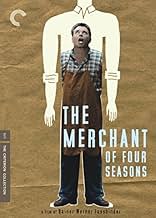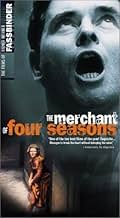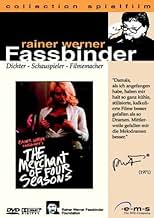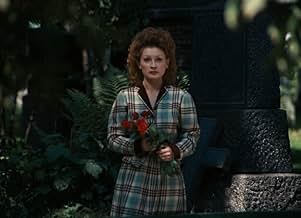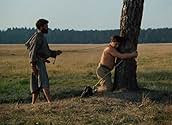NOTE IMDb
7,3/10
5,5 k
MA NOTE
Hans Epp est un personnage très sociable qui tente d'obtenir le respect de chacun. Malheureusement, son existence est parsemée de nombreux revers, notamment sentimentaux. Il tombe en dépress... Tout lireHans Epp est un personnage très sociable qui tente d'obtenir le respect de chacun. Malheureusement, son existence est parsemée de nombreux revers, notamment sentimentaux. Il tombe en dépression.Hans Epp est un personnage très sociable qui tente d'obtenir le respect de chacun. Malheureusement, son existence est parsemée de nombreux revers, notamment sentimentaux. Il tombe en dépression.
- Réalisation
- Scénario
- Casting principal
- Récompenses
- 3 victoires et 5 nominations au total
Walter Sedlmayr
- Fruit cart salesman
- (as Walther Sedlmayer)
El Hedi ben Salem
- The Arab
- (as Salem El Heïdi)
Avis à la une
In Fassbinder's earlier films, his ideas sometimes surpased his ability to execute them. He was always a great writer, but it took him some time to get his style of camera work and storytelling down pat.
The Merchant of Four Seasons is one of Fassbinder's first movie to make great use of color, from the bright green pears in the merchant's cart to the bright red roses at the funeral (a funeral in a Fassbinder movie? who'd have thought).
His camera work was getting there too, but it was still fairly minimalist. The occasional zooms seem a bit uncomfortable at times and unnatural, but then again, Fassbinder was still coming out of his purely avant garde phase. This might be because Michael Ballhaus isn't behind the camera, but instead the slightly inferior Dietrich Lohmann.
Still, this is Fassbinder, and you get your fix here. Broken dreams shown so vividly and unflinchingly as to alienate audience and drive them into a depressed stupor. Just what the doctor ordered. An early classic that shows remarkable progression when compared to his first films released only 2 years prior.
The Merchant of Four Seasons is one of Fassbinder's first movie to make great use of color, from the bright green pears in the merchant's cart to the bright red roses at the funeral (a funeral in a Fassbinder movie? who'd have thought).
His camera work was getting there too, but it was still fairly minimalist. The occasional zooms seem a bit uncomfortable at times and unnatural, but then again, Fassbinder was still coming out of his purely avant garde phase. This might be because Michael Ballhaus isn't behind the camera, but instead the slightly inferior Dietrich Lohmann.
Still, this is Fassbinder, and you get your fix here. Broken dreams shown so vividly and unflinchingly as to alienate audience and drive them into a depressed stupor. Just what the doctor ordered. An early classic that shows remarkable progression when compared to his first films released only 2 years prior.
The Merchant of Four Seasons received all major W German film awards for 1971 but it took a couple of more years for Fassbinder to break through internationally. TM4S is a fairly simple story but it can be difficult or painful to watch due to the subject matter: class prejudices, domestic violence, infidelity, family discord, depression and self-destructive behavior. In other words it presents a bleak view of the world and its human inhabitants. I believe there's an undercurrent of cutting humor throughout although it's interesting that no examples spring to mind and it's not campy. I saw TM4S in the mid-70s and in 2015 didn't remember much at all (other than not liking it), which suggests I repressed a lot that first time. I now think it's the first of a few masterpieces by a director whose importance will certainly endure.
The Merchant of Four Seasons isn't what I would call a happy movie, at all, or even one that impressed me to the point of praising it to the sky (there are other Fassbinder flicks for that, like Veronika Voss and the underrated Satan's Brew). But it's certainly no less than a fascinating experiment in taking a look at those in a society that you and me and others we know might possibly know, or not really want to know. I imagine in the early 70s in Germany a generation, coming out of WW2, had a stigma to live with but tried their best just to get by. This is a stigma that floats all over this film, and in many instances in Fassbinder's work in general, but especially because with Four Seasons he takes his eye on the middle class, and a particular married couple- the distanced, depressed, angry Hans the fruit seller and his long-suffered wife- that is nothing short than trying for realism in the guise of melodrama. If Cassavetes were a crazy German he might make this film, maybe even as just a lark.
The story sounds simple enough, where Hans' drinking gets out of control, he beats his wife (this scene is one of the toughest to take, maybe in just any movie, the way Fassbinder's camera lingers without a cut as his wife is left helpless and their daughter trying to stop him in his frenzy) and then she's ready to leave him. As he stands in the room, her family holding him back, she makes the call for divorce and he gets a heart attack right there. He recovers, his business suddenly starts booming again with some help from some good (or not so good) employees - and yet this only continues his longing, for another woman, and his despair in general.
And yet it's in this simplicity that Fassbinder tries, and succeeds for the most part, in attaining a mood of dread, of a tense vibe in a kitchen or in the bedroom or out on the street that you can cut with a knife and bleed out. The weakest part of this all may be the acting... at least that was my initial impression. Hans, played by Hirschmuller, can be a stilted presence, with only the slightest movements in his face and eyes, and for a while it doesn't look like he's much of a good actor. The actress playing his wife, Irm Hermann, and her sister (Fassbinder Hanna Schygulla) fare better, but only cause they're given more to do conventionally, like cry or look concerned. It takes some time to adjust to what is, essentially, a void in his guy Hans, of something from his own psychological self-torment or self-pity that pervades himself and those around him who just want to get on with some sense of normalcy, especially once Hans gets successful.
Not everything clicks together in The Merchant of Four Seasons, but enough did to make me recommend it to those looking for a different slice-of-life than you might be used to with more modern American movies. Fassbinder's world here is a combat between the melodrama he loves in cinema and the harsh, crushing sense of humanism that he feels personally and puts into characters that, for better or worse, we somehow identify with. Are the Epps a family you know of? Or could you even be them? Who's to say. It's a methodical study of tragic emptiness in the human spirit, and its goals are all attained.
The story sounds simple enough, where Hans' drinking gets out of control, he beats his wife (this scene is one of the toughest to take, maybe in just any movie, the way Fassbinder's camera lingers without a cut as his wife is left helpless and their daughter trying to stop him in his frenzy) and then she's ready to leave him. As he stands in the room, her family holding him back, she makes the call for divorce and he gets a heart attack right there. He recovers, his business suddenly starts booming again with some help from some good (or not so good) employees - and yet this only continues his longing, for another woman, and his despair in general.
And yet it's in this simplicity that Fassbinder tries, and succeeds for the most part, in attaining a mood of dread, of a tense vibe in a kitchen or in the bedroom or out on the street that you can cut with a knife and bleed out. The weakest part of this all may be the acting... at least that was my initial impression. Hans, played by Hirschmuller, can be a stilted presence, with only the slightest movements in his face and eyes, and for a while it doesn't look like he's much of a good actor. The actress playing his wife, Irm Hermann, and her sister (Fassbinder Hanna Schygulla) fare better, but only cause they're given more to do conventionally, like cry or look concerned. It takes some time to adjust to what is, essentially, a void in his guy Hans, of something from his own psychological self-torment or self-pity that pervades himself and those around him who just want to get on with some sense of normalcy, especially once Hans gets successful.
Not everything clicks together in The Merchant of Four Seasons, but enough did to make me recommend it to those looking for a different slice-of-life than you might be used to with more modern American movies. Fassbinder's world here is a combat between the melodrama he loves in cinema and the harsh, crushing sense of humanism that he feels personally and puts into characters that, for better or worse, we somehow identify with. Are the Epps a family you know of? Or could you even be them? Who's to say. It's a methodical study of tragic emptiness in the human spirit, and its goals are all attained.
If I squint, I can see the influence of Douglas Sirk on this Rainer Werner Fassbinder soaper about fruitseller Hans Hirschmüller. He's cast as a failure, because he doesn't live up to the middle-class aspirations of his family. He runs away and joins the Foreign Legion. He returns and joins the police, but is kicked out for consorting with a prostitute. His one true love can't marry him because of his work, although she meets him for assignations. In between, he has a shrewish wife in Irm Hermann, in-laws who despise him, a heart attack, and his gradual erasure from his own life to contend with.
However, while Sirk's most famous work in the 1950s tinges his disapproval of the post-war middle class with sympathy and wonderment at peoples' refusal to admit what they want to to be happy, Fassbinder seems angry and contemptuous of his subjects. Hirschmüller is too passive, Miss Miss Hermann plays the victim card too aggressively, his family arrant, mealy-mouthed snobs, and so forth. There's no one to root for in this. There's nothing tragic about his inevitable destruction, only a sadistic, scolding examination of all that Fassbinder finds wrong with mainstream society.
However, while Sirk's most famous work in the 1950s tinges his disapproval of the post-war middle class with sympathy and wonderment at peoples' refusal to admit what they want to to be happy, Fassbinder seems angry and contemptuous of his subjects. Hirschmüller is too passive, Miss Miss Hermann plays the victim card too aggressively, his family arrant, mealy-mouthed snobs, and so forth. There's no one to root for in this. There's nothing tragic about his inevitable destruction, only a sadistic, scolding examination of all that Fassbinder finds wrong with mainstream society.
The Merchant of Four Seasons is a film about a lack of love. The film starts off with the main character; Hans Epp, returning from a spell in the foreign legion. He returns to his mother, not to be told how much she loves him, or how much she's missed him; but to be told that he is worthless and, even worse, that she would have preferred the man he went with to have come back instead. It is the character's relation to women that makes this film so hateful; the fact that his wife is taller than him is symbolic of his relation to the other gender; he is consistently humiliated by them, and it is through his relations with them that his life isn't as great as it could have been. This is also shown clearly by the way he treats his wife after a drink. He lost his job as a policeman through lust for a woman, and even his wife; a woman that is supposed to love him, never really shows any affection for him. Even at the end, his wife is more bothered about what her and her daughter will do than the state of her husband.
The Merchant of Four Seasons is a thoroughly unpleasant film. There isn't a scene in the movie where someone is happy, and not only that; but the movie seems deliriously blissful to wallow in the misery of it's central characters. The movie is certainly not recommended to anyone who is currently having a hard time, that's for sure. Despite all the misery, the film never steps out the bounds of reality; every event in this movie can - and most probably has - happened, and that only serves in making the movie more shocking. The film is, of course, helmed by Rainer Werner Fassbinder; the cult German director that committed suicide in 1982. This is only my second taste of the man's work, but through just two films, it is easy to get an idea of the type of art that he creates. Both films are downtrodden and gritty - yet realistic pieces of art. His characterization in this movie is subtle; we only ever get to know the characters through their plight's and not through their character. This is a very clever way of showing the audience that it is their surroundings that define the people in the film, not the people themselves - and as nearly everyone that sees the film knows what living in an urban society is like, it wont difficult for the majority of people to relate to.
The Merchant of Four Seasons is not a film that is easily forgettable; the movie is high on substance and low on style, and that makes for a very memorable picture, and one that everyone who considers themselves to be a fan of cinema should experience. It is with that in my mind that I give this film my highest recommendations; it's not sweet and it's not pleasant, but you will not see a more realistic portrayal of depression, and this is most certainly a movie that will stay with you.
The Merchant of Four Seasons is a thoroughly unpleasant film. There isn't a scene in the movie where someone is happy, and not only that; but the movie seems deliriously blissful to wallow in the misery of it's central characters. The movie is certainly not recommended to anyone who is currently having a hard time, that's for sure. Despite all the misery, the film never steps out the bounds of reality; every event in this movie can - and most probably has - happened, and that only serves in making the movie more shocking. The film is, of course, helmed by Rainer Werner Fassbinder; the cult German director that committed suicide in 1982. This is only my second taste of the man's work, but through just two films, it is easy to get an idea of the type of art that he creates. Both films are downtrodden and gritty - yet realistic pieces of art. His characterization in this movie is subtle; we only ever get to know the characters through their plight's and not through their character. This is a very clever way of showing the audience that it is their surroundings that define the people in the film, not the people themselves - and as nearly everyone that sees the film knows what living in an urban society is like, it wont difficult for the majority of people to relate to.
The Merchant of Four Seasons is not a film that is easily forgettable; the movie is high on substance and low on style, and that makes for a very memorable picture, and one that everyone who considers themselves to be a fan of cinema should experience. It is with that in my mind that I give this film my highest recommendations; it's not sweet and it's not pleasant, but you will not see a more realistic portrayal of depression, and this is most certainly a movie that will stay with you.
Le saviez-vous
- AnecdotesAndrea Schober's debut.
- ConnexionsFeatured in Sehnsucht nach Sodom (1989)
Meilleurs choix
Connectez-vous pour évaluer et suivre la liste de favoris afin de recevoir des recommandations personnalisées
- How long is The Merchant of Four Seasons?Alimenté par Alexa
Détails
Box-office
- Budget
- 325 000 DEM (estimé)
- Montant brut aux États-Unis et au Canada
- 8 144 $US
- Week-end de sortie aux États-Unis et au Canada
- 11 623 $US
- 16 févr. 2003
- Montant brut mondial
- 8 158 $US
Contribuer à cette page
Suggérer une modification ou ajouter du contenu manquant

Lacune principale
By what name was Le marchand des quatre saisons (1972) officially released in India in English?
Répondre


